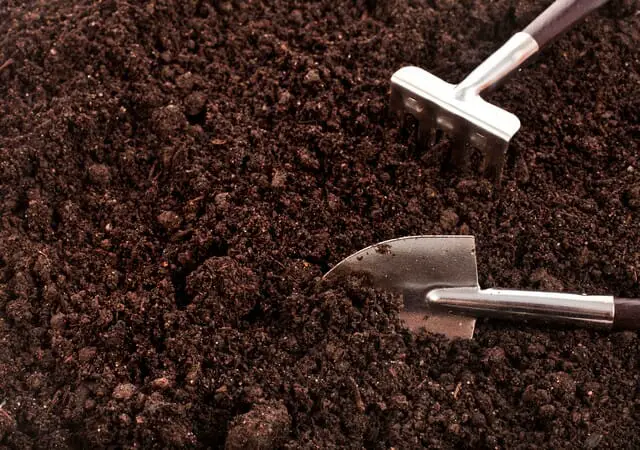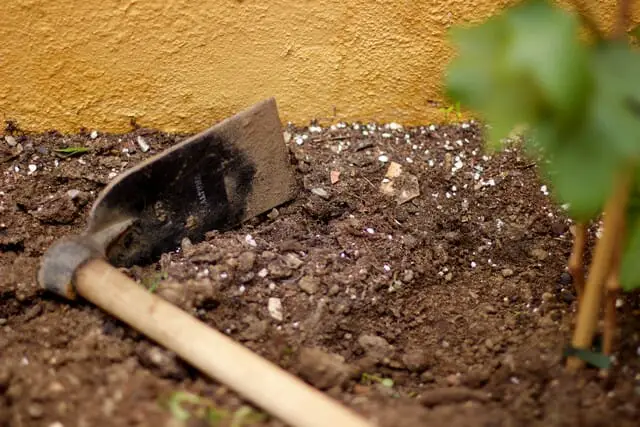Last Updated on January 14, 2022 by Grow with Bovees

Composting is often a natural process that happens in the backyard if you let a bunch of leaves pile up. It’s not an exact science but there is a way to perfect the process of recycling organic matter to make fertilizer. It is incredibly useful in reducing waste, cutting methane emissions, conserving water, and also improving soil health in organic farming.
As is the case with most things, sometimes you will run into problems with your compost. It might smell weird or the pile won’t heat up or it just turns into clumps. None of these are good signs but they are all fixable. Clumping often happens with beginners and is not a major problem.
The first thing to pay attention to is the size of these clumps and see if you can break them with your hands. If the diameter of these clumps is smaller than an inch, it is perfectly normal. In that case, just give it time and they will disintegrate on their own.
Sometimes, you might have to break the clumps simply because they are stubborn, using a compost aerator or some other type of composting tool will help with this process.
If you find the clumps to be large, like a tennis or golf ball, then something is not right. You must break them up and see if they smell weird. Fully formed compost is not supposed to smell at all so that’s how you know it is weird.
Now, there are two types of clumps: finished compost and unfinished compost. We will get to that in a minute. Before that let’s talk about what makes compost clumpy.
When there is moisture in the compost bin, you are likely to see clumpy compost. But there are certain materials that make it more so.
If there’s cardboard or wet pieces of paper in an already damp pile without mixing it well enough, there is a chance the compost will turn into balls of soggy paper. The same is the case with grass clippings which are added in bulk.
These are already wet and tend to stick together in no time. This actually leads to large-sized, anorexic clumps in your compost bin.
You will also notice the same problem if you add eggshells that are not crushed properly. If you leave the eggshell rather hollow by breaking it only into two pieces, you will notice clumps.
This is also a possibility if your compost bin has grubs in it. These multi-legged creatures tend to curl into a ball. So before you start to break them up, make sure you’re not holding a ball of worms in your hands.
Finished Compost

When your compost is finished, these balls are easy to crumble with your hands. This is often a problem found in compost tumblers because the device moves and turns in a certain fashion. This is not a problem per se and you can use the compost right after breaking them up.
If you are new to composting and don’t really want to break the balls with your hands, there are a few other ways.
- Get a compost screen and run your clumps through it. The first round will get rid of the easier clumps. For the stubborn ones, you might want to go for another round.
- Spread the compost balls on a flat surface, put on a pair of old shoes and walk on them till they break. You can also get your kids to help with it although getting your pets to run around on the compost balls is a bad idea.
- Use a wheelbarrow or a similar container. Get a pitchfork to mix the compost. You might not end up with fine compost but it will work, especially with a weed eater.
- If you have gardening tools like a chipper or a leaf shredder, you can throw the clumps in there and collect the compost dust. You might have to take some time out for this because you cannot throw the clumps in batches.
And finally, if you are not in a hurry, just wait for the process to unfold and the clumps will break down on their own.
Unfinished Compost
Now, if you are dealing with unfinished compost, there are a few signs to look for when you break the clumps. The best place to start is to check the smell and see if they have a weird odor (weird has been described earlier in this post) or you see materials that you don’t recognize your compost needs some help.
If it is too wet, it is probably anaerobic which means it does not have enough oxygen. You can help this by adding some paper products like old paper towels or maybe some coffee filters and coffee grounds. That is probably because there was too much moisture which slowed the process of decomposition and caused clumps.
When the compost is too wet, it gets packed together into balls. Another likely reason is that you might have got the greens to browns ratio wrong.
Greens are typically waste materials from the kitchen and freshly collected from the yard. These materials have a lot of moisture. Browns are dry leaks that can absorb a lot of moisture. Did you know that you can even compost dog poop if you do it the right way?
When there is too much green, the excess water in the compost bin is not absorbed and can create a lack of oxygen. When this happens the useful microbes that are supposed to aid the process drown, the composting comes to a stop and the bin starts to smell funny.
The way to fix this is to add adequate browns to the bin and mix it well. This will help break the compost balls and also give the bin the oxygen that is needed to keep the decomposition on track. There is also the option of leaving the compost bin in the sun just for a little while so that it can dry.
In Conclusion
While clumps are not ideal, when you are dealing with small balls from finished compost, you can actually put them to good use.
These clumps are quite useful in making compost tea. It is a mix of nutrients and bacteria, fungi, and microbes that love oxygen. Steep the compost in water for a day or more to make compost tea.
Clumps are not preferred because they release nutrients slowly. But you can use them under plants, to make sure they sustain for a longer time and use the slow release to your advantage.
You can also use it as mulch which is helpful in retaining water in the soil. Mulch also prevents the growth of weeds and helps to reduce soil erosion on a slope. It is a pretty great use of compost balls for shrubs and some trees, preferably ones with fruits.
But if you want non clumpy compost, there is the age-old technique of introducing worms to the mix.
